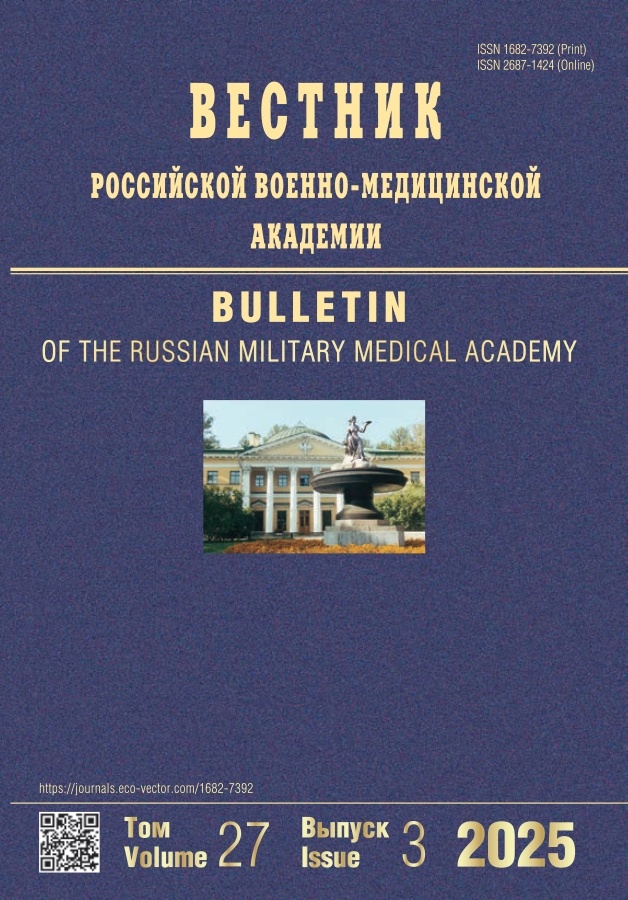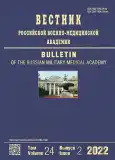Polymorphisms of genes associated with psycho-emotional deviations in a sample of healthy male conscripts
- Authors: Malyshkin S.S.1, Krivoruchko A.B.2, Kutelev G.G.2, Koreshova E.I.2, Kalyuzhnaya O.V.1, Shapoval R.M.1, Derevyankin D.S.1, Zhurbin E.A.1, Potapov P.K.1
-
Affiliations:
- Military Innovation Technopolis "ERA"
- Military Medical Academy of S.M. Kirov
- Issue: Vol 24, No 2 (2022)
- Pages: 299-306
- Section: Original Study Article
- URL: https://journals.rcsi.science/1682-7392/article/view/105178
- DOI: https://doi.org/10.17816/brmma105178
- ID: 105178
Cite item
Abstract
The prevalence of candidate gene polymorphic alleles associated with personality disorders was studied in a sample of healthy male Military Innovation Technopolis «ERA» recruits, science mouth operators of Caucasian race aged 23–27 (median age 24). Genotyping of 10 studied polymorphic variants of genes was carried out using polymerase chain reaction in real time. According to the results, the distribution of genotypes in the studied group of single nucleotide polymorphisms corresponded to Hardy–Weinberg equilibrium, except for the C677T MTHFR variant (rs1801133). The occurrence of minor alleles was as follows: 0.500 for A1438G and 0.310 for C102T (HTRA2); 0.175 for G-6A (CNTF); 0.508 for C > T (UCP2); 0.270 for A1298C and 0.325–C677T (MTHFR); 0.278–A2756G (MTR); 0.571–A66G (MTRR); 0.381–Alu Ins/Del (ACE); 0.294–G1444A (PPARGC1A). In the studied sample, the frequency of occurrence of minor alleles of 10 genetic markers correlated with data collected on people of European descent. The greatest statistical deviation was observed by comparison with data on people of African descent. Statistically significant concordances with different populations and studies conducted in them are the basis for including the selected polymorphisms in a candidate list of psycho-emotional and neurological pathologies influencing the occupational fitness of servicepersons. However, reliable data on the association between mental disorders and the development of degenerative disorders are not available simultaneously in all populations; therefore, additional research is required on this subject.
Full Text
##article.viewOnOriginalSite##About the authors
Svyatoslav S. Malyshkin
Military Innovation Technopolis "ERA"
Author for correspondence.
Email: svytoslavmal@gmail.com
ORCID iD: 0000-0003-4366-0028
SPIN-code: 8109-3446
Master
Russian Federation, AnapaAlexander B. Krivoruchko
Military Medical Academy of S.M. Kirov
Email: krab25@mail.ru
ORCID iD: 0000-0003-2035-4888
SPIN-code: 1324-0239
Candidate of Medical Sciences
Russian Federation, Saint PetersburgGennady G. Kutelev
Military Medical Academy of S.M. Kirov
Email: gena08@yandex.ru
ORCID iD: 0000-0002-6489-9938
SPIN-code: 5139-8511
Candidate of Medical Sciences
Russian Federation, Saint PetersburgElena I. Koreshova
Military Medical Academy of S.M. Kirov
Email: Koreshova1993@mail.ru
SPIN-code: 5310-0605
Master
Russian Federation, Saint PetersburgOlga V. Kalyuzhnaya
Military Innovation Technopolis "ERA"
Email: Ioj2004@mail.ru
ORCID iD: 0000-0002-3845-6375
SPIN-code: 1755-1405
Candidate of Biological Sciences
Russian Federation, AnapaRoman M. Shapoval
Military Innovation Technopolis "ERA"
Email: SHAP0VAL.R@yandex.ru
ORCID iD: 0000-0001-6871-1448
SPIN-code: 6114-7705
Bachelor
Russian Federation, AnapaDmitry S. Derevyankin
Military Innovation Technopolis "ERA"
Email: derev.dima1@yandex.ru
ORCID iD: 0000-0003-0370-0347
Master
Russian Federation, AnapaEvgeny A. Zhurbin
Military Innovation Technopolis "ERA"
Email: zhurbin-90@mail.ru
ORCID iD: 0000-0002-0867-3838
SPIN-code: 8426-1354
Scopus Author ID: 57198886746
Candidate of Medical Sciences
Russian Federation, AnapaPetr K. Potapov
Military Innovation Technopolis "ERA"
Email: forwardspb@mail.ru
SPIN-code: 5979-4490
Candidate of Medical Sciences
Russian Federation, AnapaReferences
- Makhnev PA, Muchnik PYu. Analiz statisticheskoi informatsii o gospitalizatsiyakh bol'nykh ehndogennymi psikhicheskimi rasstroistvami. Proceedings of the 86th Conference of the Student Scientific Society «Mechnikovskie chteniya». Saint Petersburg, 2013. P. 227–228. (In Russ.).
- Gescher DM, Kahl KG, Hillemacher T, et al. Epigenetics in Personality Disorders: Today's Insights. Front Psychiatry. 2018;9:579. doi: 10.3389/fpsyt.2018.00579
- Pasquin S, Sharma M, Gauchat J-F. Ciliary neurotrophic factor (CNTF): New facets of an old molecule for treating neurodegenerative and metabolic syndrome pathologies. Cytokine Growth Factor Rev. 2015;26(5):507–515. doi: 10.1016/j.cytogfr.2015.07.007
- Brondino N, Rocchetti M, Fusar-Poli L, et al. Increased CNTF levels in adults with autism spectrum disorders. World J Biol Psychiatry. 2019;20(9):742–746. doi: 10.1080/15622975.2018.1481999
- Dardiotis E, Arseniou S, Sokratous M, et al. Vitamin B12, folate, and homocysteine levels and multiple sclerosis: A meta-analysis. Mult Scler Relat Disord. 2017;17:190–197. doi: 10.1016/j.msard.2017.08.004
- Trautmann S, Goodwin L, Höfler M, et al. Prevalence and severity of mental disorders in military personnel: a standardised comparison with civilians. Epidemiol Psychiatr Sci. 2017;26(2):199–208. doi: 10.1017/S204579601600024X
- Coppede F, Tannorella P, Pezzini I, et al. Folate, homocysteine, vitamin B12, and polymorphisms of genes participating in one-carbon metabolism in late-onset Alzheimer's disease patients and healthy controls. Antioxid Redox Signal. 2012;17(2):195–204. doi: 10.1089/ars.2011.4368
- Mandelli L, Serretti A. Gene environment interaction studies in depression and suicidal behavior: An update. Neurosci Biobehav Rev. 2013;37(10 Pt 1):2375–2397. doi: 10.1016/j.neubiorev.2013.07.011
- Lucatelli JF, Barros AC, Silva VK, et al. Genetic influences on Alzheimer's disease: evidence of interactions between the genes APOE, APOC1 and ACE in a sample population from the South of Brazil. Neurochem Res. 2011;36:1533–1539. doi: 10.1007/s11064-011-0481-7
- Johri A, Chandra A, Flint Beal M. PGC-1α, mitochondrial dysfunction, and Huntington's disease. Free Radic Biol Med. 2013;62:37–46. doi: 10.1016/j.freeradbiomed.2013.04.016
- Geoffroy PA, Etain B, Lajnef M, et al. Circadian genes and lithium response in bipolar disorders: associations with PPARGC1A (PGC-1α) and RORA. Genes Brain Behav. 2016;15(7):660–668. doi: 10.1111/gbb.12306
- World Medical Association. World Medical Association Declaration of Helsinki: ethical principles for medical research involving human subjects. JAMA. 2013;310(20):2191–2194. doi: 10.1001/jama.2013.281053
- Malyshkin SS, Mezin AE, Ivanov AM, et al. Vyyavlenie geneticheskikh prediktorov professional'noi nadezhnosti voennosluzhashchikh. Proceedings of the III All-Russian Scientific and Technical Conference «Sostoyanie i perspektivy razvitiya sovremennoi nauki po napravleniyu «Biotekhnicheskie sistemy i tekhnologii». 2021 May 27–28. Anapa: EhRA. P. 202–208. (In Russ.).
- Certificate of the Russian Federation on the state registration of computer programs № 2022612720/ 28.02.22. Derevyankin DS, Shapoval RM, Malyshkin SS, et al. «Genetic Stats». (In Russ.).
- Jun N, Mamoru T, Snin I, et al. No association between the CNTF null mutation and schizophrenia or personality. Psychiatric Genetics. 2006;16(5):217–219. doi: 10.1097/01.ypg.0000242189.05656.9d
- Wan L, Li Y, Zhang Z, et al. Methylenetetrahydrofolate reductase and psychiatric diseases. Transl Psychiatry. 2018;8:242. doi: 10.1038/s41398-018-0276-6
- Lavedan C, Volpi S, Polymeropoulos MH, Wolfgang CD. Effect of a ciliary neurotrophic factor polymorphism on schizophrenia symptom improvement in an iloperidone clinical trial. Pharmacogenomics. 2008;9(3):289–301. doi: 10.2217/14622416.9.3.289
- Antypa N, Calati R, Souery D, et al. Variation in the HTR1A and HTR2A genes and social adjustment in depressed patients. J Affect Disord. 2013;150(2):649–652. doi: 10.1016/j.jad.2013.02.036
- Lin J-Y, Jiang M-Y, Kan Z-M, Chu Y. Influence of 5-HTR2A genetic polymorphisms on the efficacy of antidepressants in the treatment of major depressive disorder: A meta-analysis. J Affect Disord. 2014;168:430–438. doi: 10.1016/j.jad.2014.06.012
- Spies M, Nasser A, Ozenne B, et al. Common HTR2A variants and 5-HTTLPR are not associated with human in vivo serotonin 2A receptor levels. Hum Brain Mapp. 2020;41(16):4518–4528. doi: 10.1002/hbm.25138
Supplementary files








